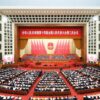
Kazakhstan’s authoritarian leader says he has authorised security forces to “fire without warning” amid a violent crackdown on anti-government protests.
President Kassym-Jomart Tokayev also said “20,000 bandits” had attacked the main city of Almaty, the epicentre of protests sparked by a fuel price hike.
He has blamed foreign-trained “terrorists”, without giving evidence.
The interior ministry says 26 “armed criminals” and 18 security officers have been killed so far in the unrest.
In a televised address, Mr Tokayev said the peacekeeping forces sent from Russia and neighbouring states had arrived on his request and were in the country on a temporary basis to ensure security.
The force from the Russian-led Collective Security Treaty Organisation (CSTO) reportedly has about 2,500 soldiers. Mr Tokayev gave “special thanks” to Russian President Vladimir Putin for sending troops.
Earlier on Friday, fresh gunfire was heard near the main square of Almaty.

Kazakhstan: The basics
Where is it? Kazakhstan shares borders with Russia to the north and China to the east. It is a huge country the size of Western Europe, dwarfing in land mass the other former Soviet republics of Central Asia.
Why does it matter? It has vast mineral resources, with 3% of global oil reserves and important coal and gas sectors. A mainly Muslim republic with a large Russian minority, it has largely escaped the civil strife seen in other parts of Central Asia.
Why is it making the news? Fuel riots have rocked the government, resulting in resignations at the top and a bloody crackdown on protesters.

The unrest began on Sunday when the cost of liquefied petroleum gas (LPG) – which many people in Kazakhstan use to fuel their cars – doubled, drawing protesters onto the streets.
The government has said that fuel price caps will be restored for six months. But the announcement has failed to end the protests, which have broadened to include other political grievances.
- BACKGROUND: Kazakhstan country profile
- CONTEXT: Why is there unrest in Kazakhstan?
Kazakhstan is often described as authoritarian, and most elections are won by the ruling party with nearly 100% of the vote. There is no effective political opposition.




























